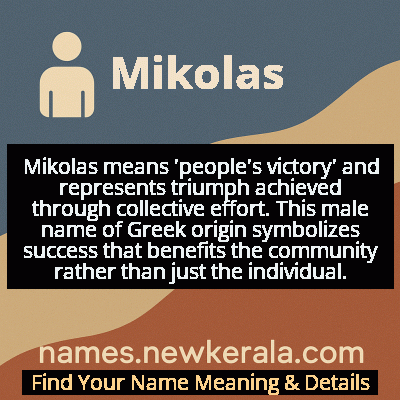Mikolas Name Meaning & Details
Origin, Popularity, Numerology Analysis & Name Meaning of Mikolas
Discover the origin, meaning, and cultural significance of the name MIKOLAS. Delve into its historical roots and explore the lasting impact it has had on communities and traditions.
Name
Mikolas
Gender
Male
Origin
Greek
Lucky Number
8
Meaning of the Name - Mikolas
Mikolas means 'people's victory' and represents triumph achieved through collective effort. This male name of Greek origin symbolizes success that benefits the community rather than just the individual.
Mikolas - Complete Numerology Analysis
Your Numerology Number
Based on Pythagorean Numerology System
Ruling Planet
Saturn
Positive Nature
Ambitious, efficient, realistic, and authoritative.
Negative Traits
Materialistic, stressed, confrontational, and can be overly ambitious.
Lucky Colours
Dark blue, black.
Lucky Days
Saturday.
Lucky Stones
Blue sapphire, amethyst.
Harmony Numbers
2, 4, 6.
Best Suited Professions
Business leaders, managers, financial services, law enforcement.
What People Like About You
Leadership, determination, organizational skills.
Famous People Named Mikolas
Mikolas Josef
Singer and Model
Czech singer who represented the Czech Republic in Eurovision 2018 and achieved international recognition
Mikolas Ales
Painter and Illustrator
Renowned Czech painter known for his patriotic themes and illustrations in Czech literature
Mikolas Kout
Athlete
Czech professional ice hockey player who has competed in international tournaments
Mikolas Tauch
Musician
Czech violinist and composer known for blending classical and contemporary music styles
Name Variations & International Equivalents
Click on blue names to explore their detailed meanings. Gray names with will be available soon.
Cultural & Historical Significance
Extended Personality Analysis
Individuals named Mikolas are often perceived as charismatic leaders with a natural ability to inspire others. They typically exhibit strong determination and resilience, living up to the 'victory' aspect of their name's meaning. These individuals tend to be people-oriented, valuing community and relationships, which aligns with the 'people' component of their name's etymology. Mikolas often demonstrates a balanced personality—combining strategic thinking with emotional intelligence, making them effective in both professional and personal settings. They are frequently described as reliable and protective, with a strong sense of responsibility toward those in their care. While they can be competitive, this drive is usually tempered by a genuine concern for collective success rather than purely personal achievement. The combination of these traits often results in individuals who are both ambitious and compassionate, capable of achieving significant accomplishments while maintaining strong social connections and community ties that give their victories deeper meaning and lasting impact.
Modern Usage & Popularity
In contemporary times, Mikolas maintains moderate popularity in Central and Eastern European countries, particularly in the Czech Republic and Slovakia where it ranks among traditional choices. While not among the top-ranking names in most Western countries, it has seen occasional use by parents seeking a distinctive yet traditional name with European roots. The name experienced a slight resurgence following Mikolas Josef's Eurovision success in 2018, which introduced the name to international audiences and made it more familiar outside its traditional regions. In recent years, it has become more recognized globally while retaining its cultural specificity, appealing to parents who want a name that honors European heritage without being overly common. Modern usage often reflects a preference for names that bridge tradition and uniqueness, with Mikolas offering a fresh alternative to the more widespread Nicholas while maintaining the same positive associations and historical depth.
Symbolic & Spiritual Meanings
Symbolically, Mikolas represents triumph through community and collective effort rather than individual achievement alone. The name embodies the concept that true victory comes through serving and leading people effectively, making it deeply connected to ideals of social responsibility and communal success. It carries strong connotations of protection and generosity, influenced by the enduring legacy of Saint Nicholas as a guardian and gift-giver figure. The symbolic meaning extends to representing cultural endurance—a Greek name that successfully integrated into Slavic cultures while maintaining its core significance across centuries and geographical boundaries. Mikolas also symbolizes the essential balance between strength and compassion, suggesting that leadership and victory are most meaningful and lasting when they benefit the broader community rather than serving individual interests. This rich symbolic tapestry makes the name carry weight beyond its literal meaning, representing ideals of community-oriented leadership and cultural continuity.

